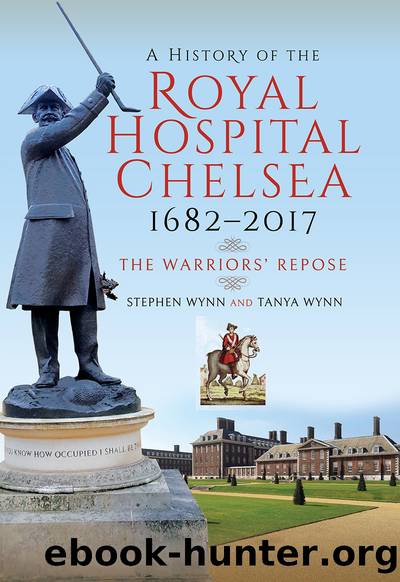A History of the Royal Hospital Chelsea 1682â2017 by Stephen Wynn Tanya Wynn

Author:Stephen Wynn, Tanya Wynn [Stephen Wynn, Tanya Wynn]
Language: eng
Format: epub
Tags: History, Europe, Great Britain, General, Medical, Caregiving
ISBN: 9781526720177
Google: vF1tuQEACAAJ
Publisher: Pen & Sword Books Limited
Published: 2019-01-15T00:45:12+00:00
Figure 42: General The Lord Walker of Aldringham.
He is yet another man who brought with him to the role of Governor of Royal Hospital Chelsea, a significant wealth of military experience. He retired in September 2018.
When looking at the list of men who have served as the Governor of the Royal Hospital Chelsea, one canât but fail to be impressed with their credentials, nearly all of them having experienced war at its worst.
Chapter 9
The First World War at the Hospital
Friday, 7 August 1914 saw an inquest take place at Chelsea Town Hall, where the Coroner, Mr Walter Schroder, and a jury, looked into the circumstances surrounding the death of William Harvey, an inâpensioner at the Royal Hospital Chelsea, who died with tragic suddenness on the evening of Monday, 3 August 1914.
It was down to Colour Sergeant Winterholder, of the Royal Hospital Chelsea, to provide the formal evidence of identification and confirm that the deceased had formerly served in the 74th Highlanders Regiment. He had been an in-pensioner at the Royal Hospital since May 1912, and had enjoyed a period of sustained good health in the two years since, although when he first arrived at the hospital, he had been somewhat emaciated and in need of a good meal.
The Coroner:âWas he a man of sober habits?â
Colour Sergeant Winterholder:âI could not call him a drunkard, but at times he took rather more than was good for him. Still, I never saw him incapacitated.â
The Coroner:âWhen did you last see him alive?â
Colour Sergeant Winterholder:âOne day last week. He then seemed quite all right.â
The Coroner:âDid he ever tell you whether he had any relatives?â
Colour Sergeant Winterholder:âWhen he entered the hospital he said he had no relatives.â
The Coroner:âWas he friendly with everybody?â
Colour Sergeant Winterholder:âYes, on the whole.â
Private William Smith of the Coldstream Guards, who was stationed at nearby Chelsea Barracks, told the court that he did not know the deceased, William Harvey. His account was that about ten oâclock on the evening of 3 August, he was walking along Lower Sloane Street, heading towards Chelsea Barracks when he caught sight of the deceased on the opposite side of the road who appeared to be in some difficulty. He noticed that the man was holding on to the railings as he walked along and a short while later he sat down on the front steps of a house. Private Smith then crossed over the road to see if he could provide any assistance to the elderly gentleman and asked him where he had been. Mr Harveyâs only reply was, âI think Iâve been drugged.â Private Smith and another soldier then slowly carried Mr Harvey back to the Royal Hospital, where they handed him over to the duty sergeant.
The Coroner then asked Private Smith a couple of questions.âWas the deceased injured in any way?â
Private Smith:âNot that I could see.â
The Coroner:âWas there any sign of a struggle?â
Private Smith:âNo sir. All of the clothing was in order.â
Police Constable John Henry Wilson, who was stationed at the Royal Hospital Chelsea, gave
Download
This site does not store any files on its server. We only index and link to content provided by other sites. Please contact the content providers to delete copyright contents if any and email us, we'll remove relevant links or contents immediately.
| Africa | Americas |
| Arctic & Antarctica | Asia |
| Australia & Oceania | Europe |
| Middle East | Russia |
| United States | World |
| Ancient Civilizations | Military |
| Historical Study & Educational Resources |
Room 212 by Kate Stewart(5125)
The Crown by Robert Lacey(4817)
Endurance: Shackleton's Incredible Voyage by Alfred Lansing(4785)
The Iron Duke by The Iron Duke(4360)
The Rape of Nanking by Iris Chang(4215)
Joan of Arc by Mary Gordon(4115)
Killing England by Bill O'Reilly(4005)
Say Nothing by Patrick Radden Keefe(3988)
I'll Give You the Sun by Jandy Nelson(3448)
Shadow of Night by Deborah Harkness(3370)
Hitler's Monsters by Eric Kurlander(3343)
Mary, Queen of Scots, and the Murder of Lord Darnley by Alison Weir(3210)
Blood and Sand by Alex Von Tunzelmann(3205)
Eleanor & Park by Rainbow Rowell(3178)
Darkest Hour by Anthony McCarten(3133)
Margaret Thatcher: The Autobiography by Thatcher Margaret(3083)
Book of Life by Deborah Harkness(2939)
Red Famine: Stalin's War on Ukraine by Anne Applebaum(2935)
The One Memory of Flora Banks by Emily Barr(2864)
